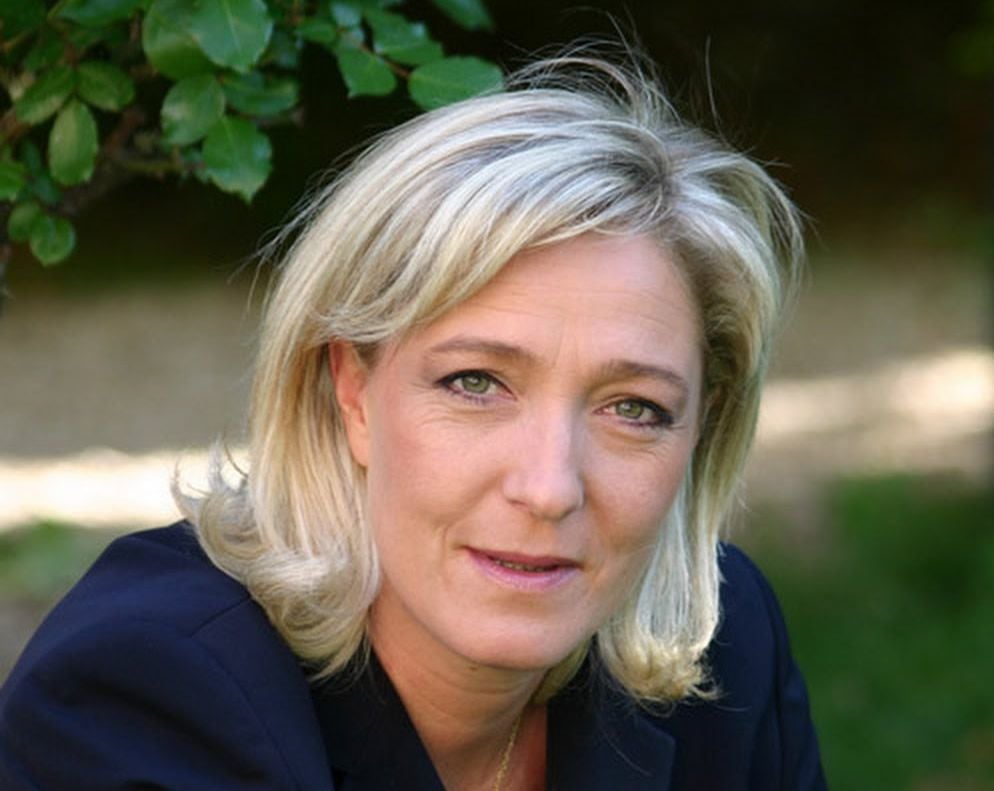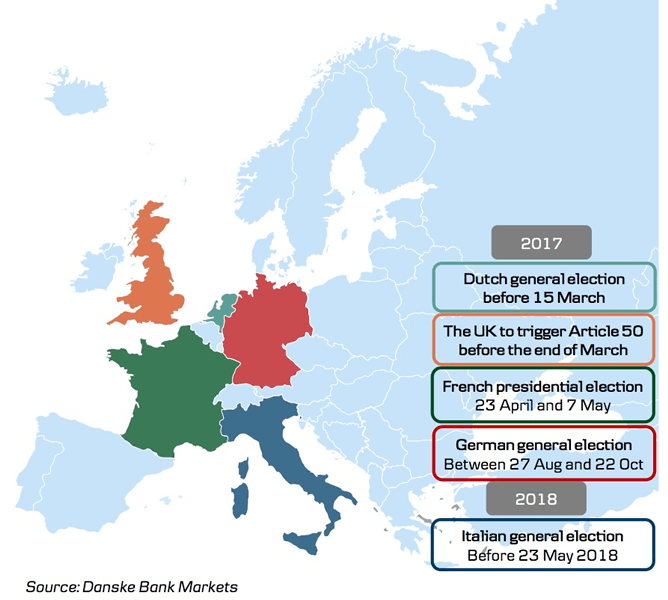Marine Le Pen can Still Win it

The next big 'thing' for the Euro will in all likelihood be political.
With major elections coming up in the Eurozone over the course of the next 12-14 months foreign exchange markets will start to attune themselves to the prospects of any anti-establishment upsets in key Eurozone nations.
We have noted that the fear of a Le Pen win in 2017 is one reason the Euro exchange rate complex could well struggle in the month's leading to the vote.
Indeed, the GBP/EUR exchange rate is forecast by analysts at French investment bank Societe Generale to remain supported until such a time Le Pen is defeated.
Arguably of most importance to the Euro is France where the prospect of anti-EU Marine Le Pen winning the Presidency are being weighed.
Early polls suggest an easy win for Francois Fillon with projections of voting at the second round of the election indicating a win for Fillon with ~66% of the vote.
"Yet, haven’t we been here before?" asks Holger Sandte at Nordea Markets. “The British are too wise to choose Brexit. Wrong. Donald Trump’s candidacy to become US president is a joke. Wrong. Marine Le Pen cannot become French president. Wait.”
Sandte tells Pound Sterling Live all the ingredients are there for an anti-establishment surprise exist in France.
Why Le Pen Could Win it
Sandte warns clients there is a greater risk of the same sort of surprise upset happening in France as happened in the UK and US.
For him, all the ingredients are there for a protest vote:
1. Continuously high unemployment of 9.6% for all and 26% for the young.
2. A shrinking manufacturing sector which means most employees now work in the more precarious services sector and gig economy.
3. A “traditionally critical attitude towards globalisation.”
4. The widespread view that France is dominated by Germany and Brussels and therefore the familiar cry of “take back control”.
5. Disenchantment with the political elite.
6. The fact the present incumbent Hollande is so unpopular.
7. Integration problems and fears about loss of tradition.
8. The Front National (FN) showing it is an alternative party which has potential to go places – it gained 25% of the vote and was the largest party in the 2014 EU elections.
That all the criteria are in place for reactionary backlash increases the risk that Le Pen may win, however, they also ignore some uniquely French factors which could also impact on the outcome.
Still an Uphill Battle
Yet, Marine Le Pen is not likely to have gained anything from association with the anti-establishment votes seen in the UK and US in 2016.
But, can it work?
“She (Le Pen) has tried to present herself as the Brexit-Trump candidate in France, but if there is one thing that does not work in French politics, it is to make an offer based on what the Americans and English do,” says Dennis McShane writing in the Independent.
MacShane was the government’s former Minster for Europe and author of a Biography on Francois Mitterrand.
“Marine Le Pen’s endorsement by Nigel Farage is a viper’s embrace and France and Fillon will hug Germany ever closer and back more, not less, into Europe,” he adds.
Then there is also the uniquely French concept of the “Front Republican”, a bi-partisan unified front which comes together to pit itself against the Front National no matter what the internal differences of the coalition.
The Front Republican was behind Jaques Chirac’s win in 2002 against Marine Le Pen’s father Jean Marie.
The Front Republican was comprised of both left and right voters and supported Chirac to beat Le Pen.
“If no leftist candidate makes it to the second round, voters on the left could cast their votes for “Republican unity,” as they did in 2002, when they handed Chirac a landslide victory over Le Pen’s father, Jean-Marie Le Pen,” writes Hugo Drochon, Politics lecturer at the University of Cambridge, quoted on opinion site Project Syndicate.
Yet the risks this time are that leftwing voters may be put off by Francois Fillon’s right wing, catholic, social policies, especially his homophobia.
“We have been here before, and that second-round projection is based on “Republican unity,” which might not hold.Left-wing voters, put off by Fillon’s liberal economic and social conservatism, might stay home. Given pollsters’ massive predictive failures elsewhere this year, no one should count on them to turn out until the votes themselves are counted,” adds Drochon.
Fillon’s Tough Immigration Stance
One major advantage Fillon has over other candidates who might go up against Le Pen is his tough stance on immigration.
Fillon's stance is comparable to Le Pen’s and may poach Front National voters who want tighter immigration controls but are not comfortable about some of the party’s other radical policies.
His many “exoticisms”, as MacShane describes them, may also garner him some extra support awarded for a touch of ‘glamour’.
“His exoticisms – racing in the Le Mans 24 Hours, climbing mountains and marrying a Welsh girl – will get plenty of play in the press in the coming months. There is no doubt that he can beat Marine Le Pen – and Europe will heave a sigh of relief,” comments MacShane.
Le Pen’s Policies
The Front National’s new manifesto is not yet available, so the 2012 manifesto is the next best alternative.
Le Pen, predictably, wants to get rid of the EU and replace it with a “European Union of States” which would include Russia and Switzerland but not Turkey.
There would, therefore, be a referendum on France’s membership of the EU.
France would make no contribution to the EU budget.
The Franc would be reintroduced so that traditional industries could be reenergised via competitive currency devaluation, which basically means France devaluing the Franc to make its exports more competitive.
France and Germany would work together to reorganise EU monetary policy.
Nordea’s Sandte, commenting on the viability of the policies, argues that competitive currency devaluation is unlikely to ‘make France great again’ since it is an old-fashioned policy which will not work as well today as it did before.
“Especially regarding the currency-related aspects, this programme sounds to us like it is inspired by nostalgia, making France great again by reverting back to the recipes of the 1970s and 1980s. The world has changed since then, competition has become harder. We doubt very much that this is the way to make France thrive,” said Sandte.
Yet Sandte remains cautious: "Marine Le Pen cannot become French president. Wait."
Save
Save

